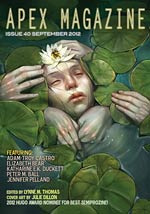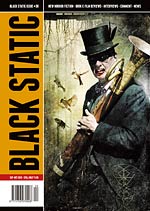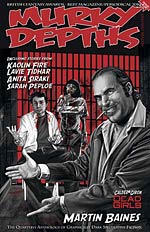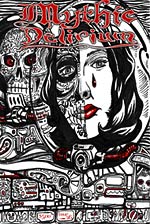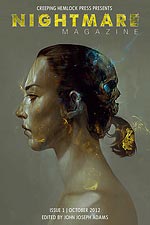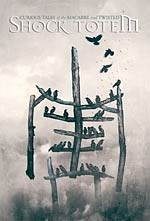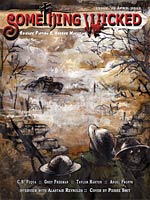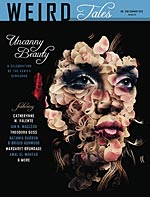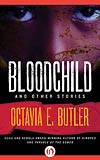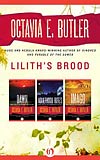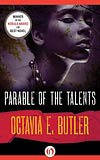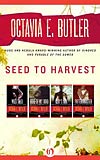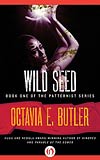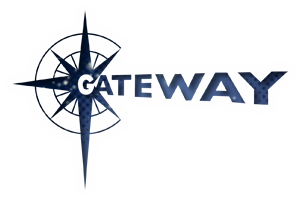Horror Magazines
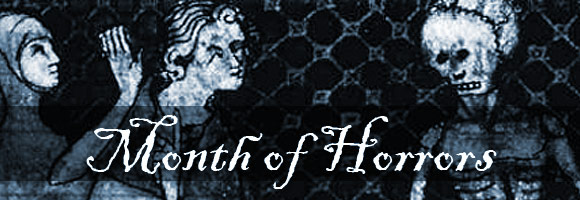
I’ve been hearing for years that genre magazines are going the way of the Dodo. From where I’m standing, it looks like a pretty healthy market. On our Magazines page we have listed over 70 genre magazines for you to choose from and we keep finding more new ones to add all the time.
For our Month of Horrors I wanted to point out some of the Horror magazines from out list. If you’re looking for something creepy and scary these magazines will get the job done. Check ’em out and if you find something you like show your support by subscribing!
Apex Magazine
Apex Publications started as a tingle in the mind of Jason Sizemore during the month of November in the year 2004. Having been a fan of the small press scene for several years, he noticed a lack of a certain type of fiction: Science-Horror.
Black Static
Black Static is a horror magazine that has earned much praise for its style, bravery, editorial and fiction content. Its stories are innovative and daring, never afraid to shock or disturb yet never forget to entertain.
Murky Depths
Murky Depths is a quarterly anthology with a difference. It features top quality speculative fiction with sprinklings of horror and fantasy that push the boundaries of science fiction. Each story is complimented with its own unique artwork.
Mythic Delirium
Mythic Delirium is a biannual journal that publishes science fiction, fantasy, horror, surreal and cross-genre poetry.
Nightmare Magazine
Nightmare is an online horror and dark fantasy magazine. In Nightmare’s pages, you will find all kinds of horror fiction, from zombie stories and haunted house tales, to visceral psychological horror. No subject is off-limits, and we will be encouraging our writers to take chances with their fiction and push the envelope.
Nightmare is brand new on the market – their first issue was released October 1st.
Shock Totem
Shock Totem is a bi-annual dark fantasy and horror publication. Our first issue was published in July of 2009. We focus on the one thing that matters most: the story. Back to basics. Each issue features fiction that we, as readers, enjoy. Within our pages, new and established authors are equals.
Something Wicked
Something Wicked is a monthly online and electronic-download science fiction and horror magazine. Published monthly, we feature some of the best new voices in horror and science fiction from around the world.
Tales of the Unanticipated
Tales of the Unanticipated is a journal of speculative fiction, fantasy, horror, and stories that you just wouldn’t anticipate. Tales of the Unanticipated is currently published annually.
Weird Tales
Weird Tales was launched to showcase writers trying to publish stories so bizarre and far out, no one else would publish them — stories of unearthly dimensions and dark possibilities, gothic seductresses and cosmic monstrosities.
Adieu, DRM
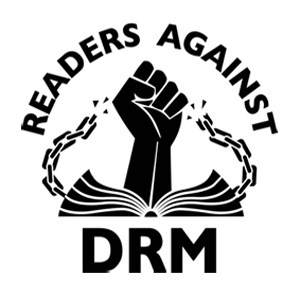 Tor has extended their DRM-free book policy across the pond:
Tor has extended their DRM-free book policy across the pond:
As of today, Tor UK, Pan Macmillan’s science fiction and fantasy imprint, has made its eBooks DRM-free and available to purchase from the Tor UK Ebookstore. In a move announced earlier this year, Tor UK has joined sister company Tor Books in New York in removing Digital Rights Management from all its titles so that once you purchase a Tor UK book, you can download it as many times as you like, on as many ereaders as you like.
Back in April, John Scalzi, this year’s Worldcon MC, applauded the decision:
As an author, I haven’t seen any particular advantage to DRM-laden eBooks; DRM hasn’t stopped my books from being out there on the dark side of the Internet. Meanwhile, the people who do spend money to support me and my writing have been penalized for playing by the rules. The books of mine they have bought have been chained to a single eReader, which means if that eReader becomes obsolete or the retailer goes under (or otherwise arbitrarily changes their user agreement), my readers risk losing the works of mine they’ve bought. I don’t like that.
Cory Doctorow believes this means the end to the format wars:
I’d expect someone to make a browser plugin that draws a “Buy this book at BN.com” button on Amazon pages (and vice-versa), which then facilitates auto-conversion between the formats. I’d also expect BN.com to produce a “switch” toolkit for Kindle owners who want to go Nook (and vice-versa).
China Miéville, speaking at the Edinburgh International Book Festival last weekend, looked beyond tearing down just DRM, predicting the remixing of content at will:
Be ready for guerrilla editors. Just as precocious 14-year-olds brilliantly – or craply – remix albums and put them up online, people are starting to provide their own cuts of novels. In the future, asked if you’ve read the latest Ali Smith or Ghada Karmi, the response might be not yes or no, but “which mix”, and why?
It’s a brave new (publishing) world that has such content in it!
Octavia E. Butler Comes to eBooks for the First Time
 Octavia E. Butler (1947–2006) was a bestselling and award-winning author, considered one of the best science fiction writers of her generation. Among her many awards she recieved the 1985 Hugo Award for Best Novelette for "Bloodchild" and the 1999 Nebula Award for Parable of the Talents.
Octavia E. Butler (1947–2006) was a bestselling and award-winning author, considered one of the best science fiction writers of her generation. Among her many awards she recieved the 1985 Hugo Award for Best Novelette for "Bloodchild" and the 1999 Nebula Award for Parable of the Talents.
Open Road Integrated Media has created the above video to celebrate their newly launched ebook series of the works of Octavia E. Butler. (More scenes from the documentary are forthcoming.) The 12 volume series covers the bulk of Butler’s books including her Xenogenesis and Patternist series which you can read singly or in their omnibus editions Lilith’s Brood and Seed to Harvest respectively.
From the Open Road site: "Butler was the first African-American woman to come to prominence as a science fiction writer. Published early in her career in small print runs and without much attention, she evolved into a major force in both science fiction and mainstream literature as audiences came to appreciate how her work dealt boldly with such topics as race, religion, gender and social structure."
This is the first time her works have been made available in ebook format and each includes an illustrated biography featuring never before seen photos.
Why Losing Borders Could be Good
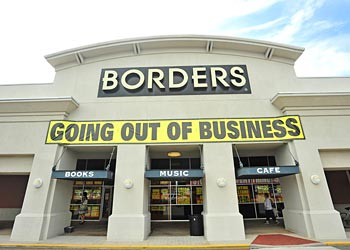 When I was a kid, looking for books was a serious enterprise. We had our mall stores and our mom-and-pop bookshops, but the selection was limited to bestsellers (in the mall) or miles and miles of Harlequin romances (in used shops). For a treat, I’d get to go 20 miles out to the only sizable bookstore in town. Taylor’s Books was smaller than an average Barnes and Noble today, but back then it was enormous. They had a Dungeons and Dragons section that set my mouth watering, and the science fiction section spanned two whole rows (hey, I said it was big for THEN).
When I was a kid, looking for books was a serious enterprise. We had our mall stores and our mom-and-pop bookshops, but the selection was limited to bestsellers (in the mall) or miles and miles of Harlequin romances (in used shops). For a treat, I’d get to go 20 miles out to the only sizable bookstore in town. Taylor’s Books was smaller than an average Barnes and Noble today, but back then it was enormous. They had a Dungeons and Dragons section that set my mouth watering, and the science fiction section spanned two whole rows (hey, I said it was big for THEN).
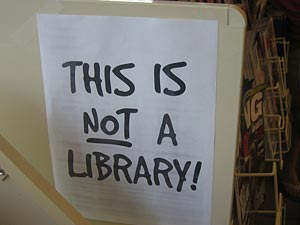 There was only one problem. I was a kid, and I couldn’t buy everything I wanted. One thing a kid does have (in spades) is time. I would sneak a peek at the latest Stephen R. Donaldson book, only to get called out by an employee, who would say "this is NOT a library!" Chastened, I would put the book back, making a mental note to peruse it more briefly, later.
There was only one problem. I was a kid, and I couldn’t buy everything I wanted. One thing a kid does have (in spades) is time. I would sneak a peek at the latest Stephen R. Donaldson book, only to get called out by an employee, who would say "this is NOT a library!" Chastened, I would put the book back, making a mental note to peruse it more briefly, later.
In the 90s, all that changed. Waves of new corporate bookstores, like Barnes and Noble and Borders, swooped in with larger inventories and new policies. People talked about how they served coffee, and gave customers places to sit. Their real advantage however was especially relevant to me:
They let you read books for as long as you wanted.
 Look, before you give me the speech about poor mom and pop (how are they going to pay their mortgage), let me just say that I kept going to those places… for years. The DO NOT READ signs were still up. There was still an absence of chairs. Taylors eventually put out a single pot of (stale) coffee, almost as if to say "there’s your stinking coffee, now shut up and shop with us again." Small business was not adapting to their competition. People talked about how local bookstores couldn’t compete with behemoth store pricing, but it was really the customer service that wasn’t competitive.
Look, before you give me the speech about poor mom and pop (how are they going to pay their mortgage), let me just say that I kept going to those places… for years. The DO NOT READ signs were still up. There was still an absence of chairs. Taylors eventually put out a single pot of (stale) coffee, almost as if to say "there’s your stinking coffee, now shut up and shop with us again." Small business was not adapting to their competition. People talked about how local bookstores couldn’t compete with behemoth store pricing, but it was really the customer service that wasn’t competitive.
Today, the shoe is on the other foot. Last month, I walked into a Borders books with a huge "going out of business" sale. The whopping discount that generated all the crowds: 20%. Seriously. I mentioned to my buddy that Amazon had the same books at 40% with free shipping. A clerk overheard me and responded: "Yeah, but you can take this one home today. It’s worth paying more." Ah, I thought, this is why you are going out of business. It isn’t the price, per se. It’s the expectation that I (the consumer) will behave the way he expects me to. I was supposed to adapt to them. That clerk was right about one thing: Price isn’t everything. As a consumer, I am perfectly willing to pay more for something if I have a compelling reason… but it has to be my reason.
This is why mom-and-pops should celebrate the demise of Borders (and the subsequent troubles at Barnes and Noble). There is room, now, for brick and mortar competition. The little guys have a second chance, but now they have to adapt to Amazon as well as bigger (albeit struggling) stores. The good news? It can be done.
A couple of years ago, I had the good fortune to visit Borderlands Books in San Francisco. They are a small shop that specializes in SF/F books. The store is physically small, but beautiful. It has well polished hardwood floors, custom-made bookcases that leave little room for empty space, and an exhaustive selection of new and used books (many of which are rare). The real secret of its success, however, lies in its employees. I wanted to document the store’s look, so I created a 2 gigapixel image to take home with me. While I waited for the gizmo to take its hundred or so pictures, I spoke with some of the employees, who had a great deal to say about virtually any book I mentioned. When was the last time I encountered real product knowledge from a clerk at a bookstore? Never. This was an entirely new experience for me, and I liked it. I also found out that Borderlands offers a monthly newsletter for their community (when have you ever heard of a Borders "community?"), and they seem to have 5-6 book signings each month. If these guys were in Dallas, I wouldn’t shop anywhere else.
Here are the advantages that I see for independents:
- They can be niche. There’s no way a corporate store could have much depth, because they are incented to not stock slow selling books. We have a list of SF/F bookstores that are making niche work.
- Higher margins. It may sound counter-intuitive, since chain bookstores get to buy new books at wholesale by buying in volume, but small shops often sell new and used books side-by-side. They can buy a $12 paperback off their customers for $3 and sell it for $6. That’s a 100% markup.
- The ability to browse. As good as Amazon is, it’s still not ideal for browsing. Fan sites (like Worlds Without End) try to fill this niche by organizing books according to awards, best-of lists, and the recommendations of fellow fans. Nevertheless, even we can’t compare to a brick and mortar store with a strong selection and knowledgeable staff.
As many shop owners may point out, there are many challenges to small bookshops that I have not addressed. Nevertheless, I believe having one fewer corporate chain in the mix can only be good for the sorts of stores I’d rather shop.
Gollancz releases every book… ever.
You may have noticed on the novel page that a new button sometimes appears underneath the cover image. Worlds Without End has started including "Add to Amazon Kindle" buttons for those titles that are available on Amazon electronically. You will see this button more and more as we update our database. Once this project is completed, we’ll look at adding Nook, ePub, and mobi editions (where available)
This is our second push for ebook support. The first came a few years ago, when we added the public domain ebook list, where you can download dozens – destined to be hundreds – of public domain books to your ebook reader or computer.
Just as we begin to get serious about adding these links to our site, we hear that Gollancz, the second winningest publisher in our database, is taking many of their out-of-print classic books and making them available as ebooks. The SF Gateway website is going to be "the world’s largest digital SFF library." We couldn’t be more thrilled, since several of our (especially Hugo) winning titles have been out of print for some time.
Now, for your perusing pleasure, here is a list of authors, or their estates, who have already decided to release their corpus for digital reading:
Poul Anderson • Barrington J. Bayley • Gregory Benford • Michael Bishop • James P. Blaylock • James Blish • Marion Zimmer Bradley • John Brosnan • Fredric Brown • John Brunner • Algis Budrys • Kenneth Bulmer • Edgar Rice Burroughs • Pat Cadigan • John W. Campbell Jr • Terry Carr • Arthur C. Clarke • Hal Clement • D.G. Compton • Michael G. Coney • Edmund Cooper • Richard Cowper • John Crowley • L. Sprague de Camp • Samuel R. Delany • Philip K. Dick • Gordon R. Dickson • Christopher Evans • Philip Jose Farmer • John Russell Fearn • Alan Dean Foster • Mary Gentle • Mark S. Geston • Joseph L. Green • Colin Greenland • Nicola Griffith • Joe Haldeman • Harry Harrison • Frank Herbert • Philip E. High • Robert Holdstock • Cecelia Holland • Robert E. Howard • Raymond F. Jones • Leigh Kennedy • Garry Kilworth • Damon Knight • Henry Kuttner • Tanith Lee • Murray Leinster • H.P. Lovecraft • Katherine MacLean • Barry N. Malzberg • Phillip Mann • David I. Masson • C.L. Moore • Ward Moore • Edgar Pangborn • Frederik Pohl • Rachel Pollack • Tim Powers • Mack Reynolds • Keith Roberts • Eric Frank Russell • Josephine Saxton • Bob Shaw • Robert Silverberg • Clifford D. Simak • Dan Simmons • John Sladek • Cordwainer Smith • E.E. "Doc" Smith • Norman Spinrad • Olaf Stapledon • Theodore Sturgeon • William Tenn • Sheri S. Tepper • James Tiptree Jr • E.C. Tubb • George Turner • Harry Turtledove • Jack Vance • Ian Watson • Ted White • Kate Wilhelm • Connie Willis • Robert Charles Wilson • Gene Wolfe



















 Full Details
Full Details
